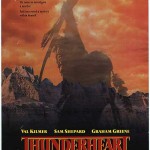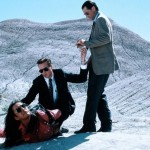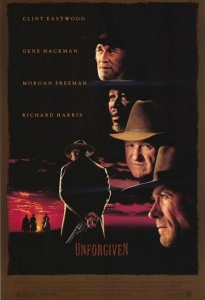Thunderheart (1992)
Dir: Michael Apted
Stars: Val Kilmer, Sam Shephard, Graham Greene & Ted Thin Elk
Links: http://www.imdb.com/title/tt0105585/
http://www.rottentomatoes.com/m/thunderheart/
You’ll hear me refer to some movies as “medium sized” a lot: Thunderheart is a perfect example of a “medium sized” film. So, what exactly makes a film “medium sized” you ask?
1) Release Date: The film was released Apr 3, 1992. It wasn’t between May and early August and it wasn’t between early November and Christmas week. Therefore, it’s a medium sized movie because it was providing “filler” to the slate between the Summer and Holiday blockbuster seasons.
2) Medium Star Power: Thunderheart had an “up and comer” (at the time) in Val Kilmer, fresh off his portrayal of Jim Morrison in The Doors. The production had a veteran in Sam Shephard (reliable as phases of the moon) and genuine Native Americans for the roles in Graham Greene (Dances with Wolves) and Ted Thin Elk. Not only did Mr. Thin Elk have an ultra-awesome name, he was a real tribal leader! Anyhow, while Kilmer was no doubt recognizable to audiences, I can see where the remaining cast wasn’t necessarily top of mind; this element again supports Thunderheart as a medium sized production.
3) A Studio Produced, Albeit Not a “Big 6” Studio: There are six major film studios, in no particular order, of course – Warner Bros, Paramount, Universal, Sony Pictures (formerly Columbia: Tri-Star was part of this company, too), 20th Century Fox, and Walt Disney. While MGM used to be a major player, it’s now medium sized. Tri-Star, the production company behind Thunderheart, was a medium-sized player before it dissolved and its staff became part of Columbia, which became part of Sony Pictures. Tri-Star’s equivalent today would be Lionsgate (they’re behind many horror movies like the Saw series and super-action films like Crank) and Summit Entertainment (they picked up Twilight and became medium sized overnight). These medium sized studios are bigger than “boutique” or independent studios (like Fox Searchlight, Focus Features and others). I digress: the point is that even the studio behind this film wasn’t massive. But I did note ol’ Bob DeNiro’s production credit (his Tribeca Films co-produced).
4) The Story Is Entertaining – And Manageable!: I adore “medium sized” movies because they don’t try and hit a home run, they just hit a nice single or double into the outfield. Thunderheart had an exotic location in South Dakota – granted, maybe not top of mind as a vacation destination, but exotic nonetheless. Chances are, most of the audience hadn’t been where we’re going, which is always a plus. The story is to a certain extent, a typical “whydunnit” murder tale: or is it? There’s a lot going on with Kilmer’s character being born a quarter Sioux, and his ongoing struggle to confirm or deny who he is. Some of the best scenes are shared with Kilmer and Mr. Thin Elk. Whether the scene was set in the old Chief’s trailer home or around the campfire, Thin Elk’s dictation of the visions he has had of Kilmer’s FBI Agent are downright creepy, particularly as Graham Greene’s character translates. Once again, this isn’t a story with all kinds of special effects and explosions – it succeeds in its intent of simply getting on second.
FINAL THOUGHT: I just want to be sure and mention that the director of this picture, Michael Apted, is a certified BAD ASS. If you look at the imdb.com link above and click on him, you’ll see the body of work he’s done, which includes a fascinating documentary series in which every ten years, he’s interviewed the same nine British residents for the past forty years or so! He also directed several episodes of HBO’s incredible series Rome, which I dearly miss.





